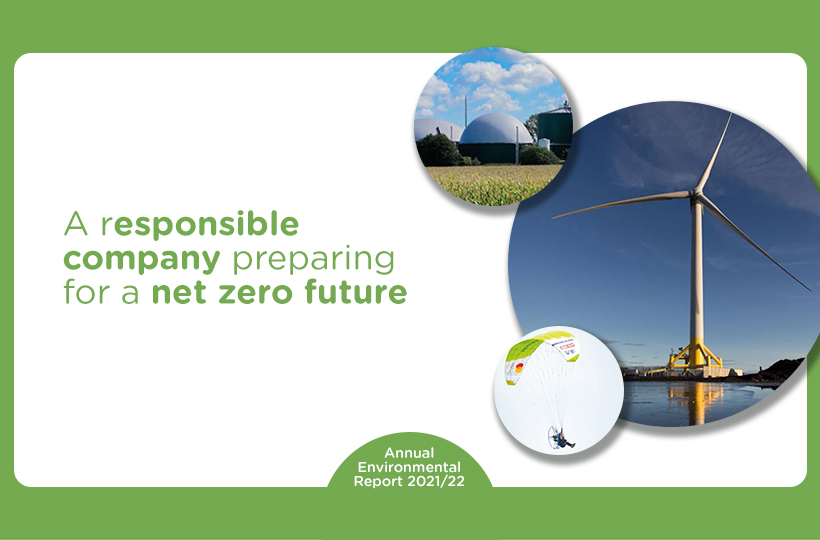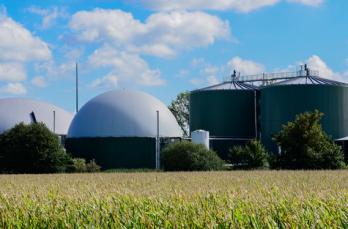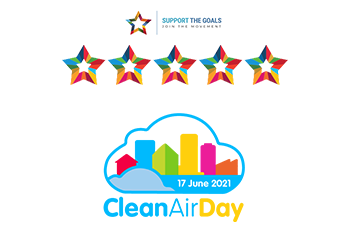
As a gas network, we are aware that we have significant environmental impacts. We want to improve those impacts while making our company a sustainable business to support the energy transition required to meet the UK’s net zero target.
Our Annual Environmental Report 2021/22, published in accordance with the RIIO-GD2 Environmental Reporting Guidance provided by Ofgem, has provided us with a timely opportunity to outline the actions we’re taking as part of our environment strategy.
It’s our ambition to reach net zero emissions by 2045, in line with the Scottish Government’s target, and our strategy is also aligned with the United Nations Sustainable Development Goals (SDGs). Our environmental aspects range from natural gas emissions to waste production, and we have a number of processes in place to manage these in our daily operations.
Decarbonisation and achieving net zero are about reducing the environmental emissions we have today (reducing emissions from shrinkage, our commercial fleet and properties and from our supply chain). It is also about energy system decarbonisation, which is reducing the reliance on natural gas, which is a fossil fuel, and supporting the transition to hydrogen and other green gases. Innovation is key not only for decarbonisation of the network and our business but can also provide solutions to challenges such as waste and use of resources. Our Energy Future’s team is heavily involved in various hydrogen projects across the UK and we’re also engaged in biomethane projects, and work with stakeholders to ensure we can connect more biomethane plants to our networks.
We have been actively engaging with stakeholders from UK and Scottish Governments, local authorities, potential producers and users of hydrogen. We have participated in industry conferences such All-Energy in Scotland, Utility Week Live in Birmingham and a number of smaller workshops and events. The stakeholder engagement we are undertaking through our regional studies such as Edinburgh, Tayside and London have been crucial to understand what stakeholders want and when, providing a whole system approach to decarbonisation is essential, giving consumers choice in their energy provision.
Over the past year, we have also been listening to young people. Made up of 14 to 16-year-olds from across our network regions in Scotland and southern England, the Future Thinkers Panel is an industry first, giving us the perspective of tomorrow’s customers and employees. It ensures young people are at the heart of our business and have an influential voice in our decision-making on important issues like diversity and inclusion, our Environment Strategy, the future of energy, and safety and wellbeing. The Panel has provided us with vital insights and ideas for how we could engage more with our colleagues across the business on topics of sustainability.
We have also engaged in a collaborative project with Edinburgh Napier University, which saw eight teams comprised of a cross-section of students from different disciplines present their proposals to reimagine some of our Scottish-based sites for a more sustainable future. The teams had developed opportunities for how we can respond to challenges of climate change adaptation, improve biodiversity, wellbeing, community engagement and inclusion. The ideas are such that we will be able to implement a range of them across both our networks and not just limited to Scotland.
Emissions from our building energy use has reduced over the last year compared to the previous year. Our gas consumption has reduced by 65% and electricity emissions have reduced by 46%. This is due to a combination of factors including a reduction in office space, impacts because of COVID-19 and switch to a REGO certified tariff. We procure 100% certified renewable electricity for 80% of our consumption. We’re aiming to have direct feed solar panels on all 45 of our occupied sites as well as the installation of a small 6kW wind turbine at our Thurso SIU site. Construction has also begun on our new headquarters at Horley in Surrey, a new build on an old gas holder site for which we are aiming to achieve a BREEAM excellent rating.
Over the year of 2021/22, the number of fully electric and hybrid company cars has increased to 257. This has enabled the average emissions level across the company car fleet to reduce from 94g/km to 73g/km. Our plans as set out in the Environmental Action Plan submitted to Ofgem in November 2019 was to reduce the CO2 limit by 5g/CO2 every year leading to a maximum allowance of 95gCO2/km by 2026. Current data shows we have already met and exceeded these plans. 355 electric vehicle charging points across our sites will support the increasing number of electric vehicles in our commercial fleet and future proofing offices and depots across our networks.
We’re proud of the progress we’ve made but also acknowledge the work we still have to do. Read the full report here.




